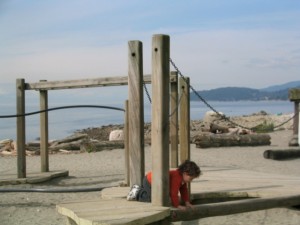Posts Tagged ‘West Van’
From Job Action To Job Action To … ?
When I chose to run as a candidate in the 2011 municipal elections, the K-12 public education system in British Columbia was embroiled in job action.
Almost three years later, the public education system in British Columbia is once again contending with a job action which many are calling the worst ever for the sheer rancour of the debate, the barbed rhetoric which abounds, and the crumbling relationships.
In other words, my entire term as a Trustee on the West Vancouver Board of Education has been characterized by the lurch from one job action to another.
While bargaining has chewed away at my time as a Trustee, it’s insatiable appetite has also served as an obstacle to discussions and innovations on a number of educational topics.
Why?
Because if you’re consistently caught up in trying to clean up the mess your guests have made with the appetizers, you’ll never have the chance to sit down with your company to enjoy the main course.
If our focus is concentrated on bargaining issues, what are we not talking about? Here’s a short-list of “big picture” items which I feel are overshadowed by the labour situation whether at a local level or provincially (in alphabetical order):
Accountability
- which Ministry reports are essential and which ones aren’t?
- is there a way to simplify school district financial reporting to ensure better utilization of staff time and resources without sacrificing the integrity and thoroughness of the information required?
- aside from the issue of underfunding, is it time to review the current funding formula?
Assessment (I know much has been done in this area and some school districts have already begun experimenting with different approaches, but I’m afraid that work has been disrupted and the information won’t be available for sharing as best practices with others.)
- what should report cards look like at each level in the K-12 system?
- how do we continue to move forward on implementing models of formative assessment?
- is there a different way to organize credits at the high school level to enable a more flexible route to graduation rather than one based strictly on work in school or on a progression through grade levels?
Age Groupings
- is grouping students according to their age still the desired approach to education?
- how do we balance the advantages of early learning with the fact that for some students a later start into a formal school environment may be more desirable?
- do all students require a full five years of secondary education or should there be a fast-track option for some learners?
Calendar (some districts are already working with different calendars)
- do we have to start school in September and stop in June with the traditional breaks at the end of each calendar year, for spring break, and so on?
- are balanced calendar models more successful for students and their families?
- what are the logistical barriers to changing the calendar within a district? That is, does it work well to have one or more schools on a different calendar or does it work better to change all at once?
Community Links
- how do we break through the walls between our communities and our schools to improve and increase relevancy and connections?
- what sort of partnerships can we build with our community without compromising the integrity of our public education system?
- how do we draw on the expertise and skills of our community members to further enhance and support school learning and the work of our educators?
These are some topics I yearn to delve into along with other issues such as the new curriculum, pre-service requirements for future educators, and the structure of practicums for student teachers.
Oh, and what exactly is a teacher’s role and what do we even mean by education in today’s world?
And while I believe that a negotiated settlement is the best foundation from which we may be able to enter into a progressive and enlightening discussion on many of these issues, it makes me very sad to acknowledge that the time needed to repair relationships once a deal is signed means we may not have the time we need to talk about such things substantively let alone implement them before we’re at the bargaining table again!
In the meantime, school districts continue to strive to do the very best for the families of this province but if each electoral mandate continues to be a Ben Hur-like chariot race from one set of failed negotiations to another, we will — all of us — have failed in our duty to build a better world for our children.
It will be a collective failure of imagination.
I Don’t Like Lockouts And Strikes
Based on “Spiders and Snakes” by Jim Stafford.
I remember when students said
“We wanna go to school today”
And we said, “Yes, you do.”
They said, “That’s where we learn and grow.
And we’re not the kind that likes to stay at home.
It’s our future.”
We said, “That’s true.”
And so they took a stroll.
Wound up beside the school yard fence
And they said, “Now what do we do?”
Cuz they found teachers hanging around
Locked out recess, lunch, from the playground,
Who then ‘splained it to them
Said, “This job action’s for you!”
They said, “We don’t like lockouts and strikes
And that ain’t what it takes to teach us.
Negotiate, negotiate.
We don’t like lockouts and strikes
And that ain’t what it takes to teach us
Like we want to be taught by you.”
Well, I think about those students all the time
I’d like to call Clark up with this rhyme
And say, “Hello Christy.”
She’d say, “What to do?”
I’d say, “Do you remember when
And would you like kids at school again?”
She’d say, “Right away buckaroo.”
Kids say, “We don’t like lockouts and strikes
And that ain’t what it takes to teach us.
Negotiate, negotiate.
We don’t like lockouts and strikes
And that ain’t what it takes to teach us
Like we want to be taught by you.”
2014 Bargaining: A Primer On Timing
As one school year draws to a close and another looms, I know many are trying to understand where we are when it comes to bargaining.
Why?
Because families plan ahead and they need to factor in those issues which may have an impact on their lives and the lives of their children. One of those issues is the outcome of labour negotiations in the public education sector and the current status of job action.
I won’t attempt to explain the positions of the parties; I just want to provide some clarity around timing as I see it.
The government and Boards of Education, via the BC Public School Employers’ Association (BCPSEA), are currently negotiating with the BC Teachers’ Federation (BCTF) on a new contract.
Both sides have stated their interest in achieving a negotiated settlement by the end of June 2014. It’s not known at this point how long the deal would be for although the last public position of the BCTF was for a four-year term while the government maintains that a 10-year term is its goal.
Earlier this spring, in response to what was seen as lack of movement at the bargaining table, the BCTF took a membership-wide vote which approved a three-phase plan for job action:
•Phase 1 – a province-wide disruption of communications with administration and the disruption of supervisory duties. The BCTF has activated Phase 1 which is currently in force.
•Phase 2 – This escalation, which is proposed but which has not been initiated, would involve rotating one-day strikes. If the BCTF invokes Phase 2, they will provide 48 hours notice to any District which will be subject to a one-day walkout.
•Phase 3 – full work stoppage. If Phase 2 is invoked and if there is still no progress at the bargaining table, the BCTF will contemplate escalating the job action. Prior to doing so, they have committed to holding another vote for their membership to approve the plan. If at that point the union gets majority support from its members for a full work stoppage, it will be required to supply Districts — and consequently families, guardians, and caregivers — across the province with three business days’ notice.
That’s a summary of where we’re at today.
Between now and the end of this school year we may or may not see a settlement and we may or may not see an escalation of the job action. Unfortunately, that’s the uncertainty with which we must all contend.
If a settlement is reached by June 30, then it will encompass a multi-year term and school will begin in September without any issue.
If a settlement is not reached by June 30, I think there are two scenarios we’ll face although there are probably others which are just as likely. We’ll either have an escalation to Phase 2 of the job action before the end of this year or, depending on how things unfold and allowing for the summer break, we could have some disruption at the beginning of the 2014-2015 school year.
Given the BCTF’s commitment to holding a full vote, I can’t imagine getting to Phase 3 of the job action prior to June 30 unless the BCTF were to leapfrog the idea of rotating strikes — and that would be publicly unpalatable — or the time lapse between the final two phases were significantly compressed.
In the event of a full work stoppage, I believe the government would act swiftly and that would likely mean the least promising outcome of this lingering dispute: a legislated settlement which sends teachers back to work while leaving much unresolved.
A shut down of the public education system would be disproportionately disruptive to students. That is, there will be students — such as my child — whose time will be filled with alternative plans and activities. However, there will be many, many students and families who will be faced with significant consequences and to whom a strike will represent hardship.
And that’s why I strongly urge BCPSEA and the BCTF to tread carefully, yet with a sense of urgency, and to settle by June 30, 2014.
If you’re interested in more of the background to public education bargaining, here’s a very well-written recent article by Katie Hyslop in the Tyee.
An Open Letter to the Premier of British Columbia
Dear Christy,
I hope you don’t mind me calling you Christy. We’ve never met, but you seem to pride yourself on connecting personally with British Columbians, so I’m sure you won’t mind my use of your first name.
I think it’s critically important for women to be involved in politics at all levels of government. I ran for the first time in 2011 and was honoured when the residents of West Vancouver elected me to be one of their trustees to the Board of Education.
Given my belief that women in politics are agents for change, it is with some hope that I viewed your election as leader of the BC Liberal Party and, subsequently, as Premier.
The opportunity to have a woman at the helm of the governing party seemed to me to be an opportunity to do things differently, to do things in a manner which is more collaborative and more substantive. To rise above partisanship and to focus on the overall good of our province and not merely to wallow in ideology.
Since then I’ve grown increasingly disillusioned by your approach to politics and governing.
Why?
Because rather than being an innovator in politics, you seem to be perfecting the art of politics by photo opportunity and soundbite rather than by policy and depth.
This is perhaps most evident in your approach to public education in our province and your reaction to the decision by Justice Griffin of the BC Supreme Court.
Essentially, Justice Griffin reaffirmed her earlier finding that legislation in 2002, enacted when you were Minister of Education, was unconstitutional and that the remedies subsequently introduced were insufficient.
This means that hundreds of millions of dollars that should have been invested in the public education system have been diverted. Not only that, but in the intervening twelve years, increases in costs, inflationary increases in conjunction with downloaded costs, have outpaced increases in funding which means that Boards of Education throughout BC have done more and more with less and less.
The continuing success of Boards should not be taken as an indication that funding is adequate. Rather, it is a testament to their resilience, and the resilience of all the partner groups including parents, that our students have continued to thrive and excel.
Imagine the success we would have had if you had maintained funding according to the terms of the 2002 collective agreement!
We would have had greater equity across school districts.
We would have more successfully addressed the needs of our most vulnerable students.
We would have kept more schools open.
To argue now, in light of the court judgement, that the solution is not affordable and that it will cause irreparable harm to students is to focus on being right rather than doing what’s right.
I’m confident that Justice Griffin was not counting on a time machine to carry us back in time and I recognize that filing an appeal is an option available to you in our legal system. I also believe the time has come for you to show leadership and to do things differently.
Negotiate a new contract with the BCTF, with new parameters for September 2014, and agree to provide the additional funding which will be required to fulfill the terms of a new agreement.
That, Christy, would reaffirm my belief in the power you have, as a woman in politics, to make a difference and, in particular, to make a difference which will undoubtedly benefit students in BC’s internationally recognized public education system.
Getting to Know Me and You
In a recent blog post, Chris Kennedy, Superintendent of Schools for West Vancouver, issued a challenge which involves providing 11 random facts about one’s self, answering 11 questions, and posing 11 questions for others to answer.
I don’t have an athlete’s competitive gene in the way Chris does, but I’m not one to pass up a challenge — particularly one which offers an easy way into kickstarting my blog for the year.
So here goes:
11 Facts About Me
- I’m the eldest child in my family and I use birth order psychology to rationalize my tendency to be bossy.
- Athletic competition is not my forte, but I was a competitive swimmer when I was younger.
- And while I may not be an athlete, my competitive instincts do tend to arise if faced with a New York Times crossword puzzle, a game of Trivial Pursuit, or any sort of game involving my five nephews.
- I was one of the original hosting staff hired for Expo 86 in Vancouver. I worked in the pre-fair period, first at the display pavilion conducting tours of the site model, and later at the Expo Centre which eventually became Science World.

- Although I did have that experience with Expo, I resigned my position before the Fair actually opened – not one of the best decisions I’ve ever made.
- I lived in Toronto from 1986 to 1992 and worked for a variety of companies including Addison Wesley Publishers, Canada Mortgage and Housing Corporation, and Rogers Cablesystems. I also obtained my MBA from the University of Toronto while there.
- During my time in Toronto, I took creative writing lessons through the Continuing Education department at the U of T. My instructor, for two terms, was Anne Michaels who subsequently found much acclaim with the publication of her novel Fugitive Pieces among other works.
- I still have the letter Ms. Michaels wrote to me at the end of one term (she wrote a letter for to each student) encouraging me to give myself the gift of time to write. I have to admit, I’ve never quite learned how to do so, but I still may.
- While working for CMHC, I was seconded to the G8 1988 Economic Summit and worked in the media centre. I think I may have caught a glimpse of Margaret Thatcher once from a very great distance!
- My return to Vancouver in 1992 was prompted by a number of factors, primarily the impending birth of my first nephew. That’s one of the best decisions I’ve ever made because it brought me back home and allowed me to play a bigger part in his life, and the lives of his brothers, than I may have been able to from far away.
- September 2014 will mark 40 years since my family moved to British Columbia and settled in West Vancouver.
Questions from Chris Kennedy:
- If you could only watch one television station what would it be? CBC Newsworld
- Looking back at your schooling, what was the silliest rule your school had? I don’t remember which is probably a clear indication that school rules aren’t as effective as we’d like them to be. Or it may only be evidence of my memory issues!
- Who is the greatest ever Canuck? I’m sure I’d answer this differently every day and we’re lucky to have so many choices. Today I’m going to pick Lester B. Pearson because I believe he was a man who had a vision of how Canada could operate on the world stage in a manner which promoted peace and reconciliation. Our political leadership now seems to have abdicated that position. [Editor’s Note: I realize now Chris meant the hockey team and not Canadians in general in which case I’ll say Trevor Linden although I was also a Harold Snepsts fan. Oh, and Kirk McLean.]
- What is the greatest rock group of the 1980s? Please see the note above re memory issues. I was a Fleetwood Mac enthusiast and also a fan of the Little River Band, but I think that may have been more reflective of the 1970s.
- What is something education related you have changed your opinion on over your career? Assessment although not necessarily academic honours and awards.
- What is the warmest place you have ever been — and how warm was it? China in July 2009. My eyeglasses would fog up as soon as a I stepped out of the hotel lobby and I remember being drenched in perspiration from morning to evening.
- Poorest fashion trend you have seen in schools in the last 10 years? Ugh to Uggs.
- What was more frustrating to deal with in your school — Pokemon cards or silly bands? Luckily my role precluded the need to deal with this issue.
- Describe your favourite high school teacher in four words. Miss Lysell: dramatist extraordinaire inspiring imaginations.
- What is the best reason to go on Facebook at least once a day? For a smile while refreshing connections with friends and family, near and far.
- If blogging was outlawed tomorrow — what would be your reaction? Phew!
11 Random Questions for You:
- When you think back to your time as an elementary and/or high school student, what’s the one thing you wish had been done differently?
- What’s your favourite movie and why?
- If you were asked for one piece of advice to offer a first year student at a post-secondary institution, what would it be?
- What was your favourite song of 2013 and why?
- Who would you say serves as the best role model for young people today?
- Think about the work you’re doing now. Is it part of a career you had planned on or are you doing something you had never thought of doing when you were younger?
- If you could pitch an idea for a television show, what would it be? (Credit for this question goes to my son!)
- On a sunny day, do you make every effort to get outside or do you sometimes prefer to stay at home?
- If you had to choose one animal to best describe who you are, what would it be? (I was once asked this question in a job interview!)
- What do you think is one thing we could do to encourage more young people to vote in municipal, provincial, and federal elections?
- What is one change you hope to make in 2014?
I Challenge the Following People to do their “Homework”:
As Chris did, I extend the challenge of this activity to the educational community in the West Vancouver School District including parents and students who write and maintain blogs. I’d also like to extend the challenge to Trustees throughout British Columbia. It’s an interesting way to allow our communities to get to know us just that little bit better beyond our role as advocates for the public education system.


